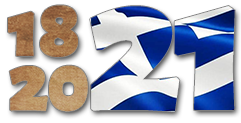Revolution in the sea


The heroine of Mykonos
The heroine of Mykonos
“During ancient times, the Greeks would believe that goddess Athena is arriving at the coasts of Attica. But her father’s cross that was shining on her chest was showing that the Christian heroine and daughter of a martyr took up arms for her faith and her homeland.”
François Pouqueville, French diplomat
The fireship captain


The fireship captain
"Konstantis, your time has come to die!"
A loud crash is heard. Many Turks fall down. That was it. The fireship hits with such force that it penetrates the flagship.
“In the name of the Lord!” He sets fire to the fireship and quickly jumps into the boat waiting for him. The Turks are panicked.
In a short time, everything has been burnt on the Turkish flagship.

One soul, one heart

One soul, one heart
But the five still endure. They encourage each other: “Brothers, let us not fear this temporary death. Let us not be intimidated by this torture, because it will end. We should only fear God. He is the One who gives strength to whomever hopes in His holy name.”
Για μας παιχνίδι ο πόλεμος
και το ντουφέκι γλέντι. (2)
Τα βόλια που σφυρίζουνε,
δε σκιάζουν τον λεβέντη. (3)
Κι είναι χαρά, πατρίδα μου,
για σε να πολεμήσω
και τη ζωή που μου 'δωσες,
να σου τη δώσω πίσω. (2)
Ένας στρατός με μια καρδιά,
σε μια φωνή θ' ακούμε: (2)
«Ελεύθεροι πεθαίνουμε
και δούλοι εμείς δε ζούμε!» (3)
Κι είναι χαρά, πατρίδα μου,...
Για μας παιχνίδι ο πόλεμος
και το ντουφέκι γλέντι. (2)
Τα βόλια που σφυρίζουνε,
δε σκιάζουν τον λεβέντη. (3)
Κι είναι χαρά, πατρίδα μου,
για σε να πολεμήσω
και τη ζωή που μου 'δωσες,
να σου τη δώσω πίσω. (2)
Ένας στρατός με μια καρδιά,
σε μια φωνή θ' ακούμε: (2)
«Ελεύθεροι πεθαίνουμε
και δούλοι εμείς δε ζούμε!» (3)
Κι είναι χαρά, πατρίδα μου,...
Of course, this song does not mean that war is a game as we see it sometimes in some videogames. This song does not praise war; war is a horrible and painful situation and causes great sufferings to the people involved.
In these verses, what is praised is the love of our ancestors for freedom. This love cast away the fear from their hearts. The fear that for 400 years was felt deeply in them. And thus they began their struggle. This is clearly seen in the verse “Ελεύθεροι πεθαίνουμε και δούλοι εμείς δε ζούμε!”, meaning that “we die free and will not live as slaves!”. This way, we too, staying away from any form of fanaticism, let us love our homeland and let us struggle for her freedom, as well as for the freedom of our souls.

Website purpose
On the occasion of the 200th anniversary of the Greek Revolution of 1821, the website fotis-istoria.gr aims to aid the younger generations in becoming familiar with the history of our homeland and getting inspired by it. Its purpose is solely educational and not profit- or advertisement-driven.
Intellectual Property Rights
For the creation of this website we used images from various sources.
We reserve all rights only for the content we created ourselves (passages - song performance - structure).